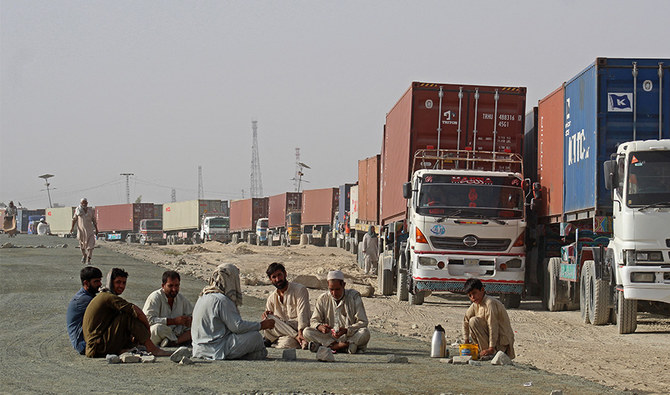KARACHI: The closure of Chaman, one of Pakistan’s major border crossings with Afghanistan, is costing local businesses up to Rs150 million ($857,942) per day in losses due to the suspension of cross-border trade, traders said.
The Chaman border crossing is the second-largest commercial border point between the two countries and links the Balochistan province of Pakistan with Spin Boldak in the Afghan province of Kandahar. It is one of the most regular trade routes used for transportation of goods between the two countries.
The crossing, a vital source of customs revenue for the cash-strapped government in Afghanistan, has been closed for about three weeks, despite repeated protests by truckers and others stuck waiting at the border.
“The border is closed since the first week of this month which is costing us between Rs100 million ($571,961) to Rs150 million ($857,942) per day,” Muhammad Hashim Khan Achakzai, the president of the Chaman Chamber of Commerce and Industry (CCCI), told Arab News.
“Every day around 10,000 people travel on both sides of the border from Chaman,” he said, adding that laborers and traders had been waiting over 20 days now for the border to open.
As Afghanistan sinks deeper into economic crisis, neighboring countries have been increasingly worried about a mass movement of refugees. Now, the closure of Chaman and interruptions to traffic at Torkham in Pakistan’s Khyber Pakhtunkhwa province, as well as the suspension of Pakistan Airlines flights from Kabul, have left Afghanistan largely cut off.
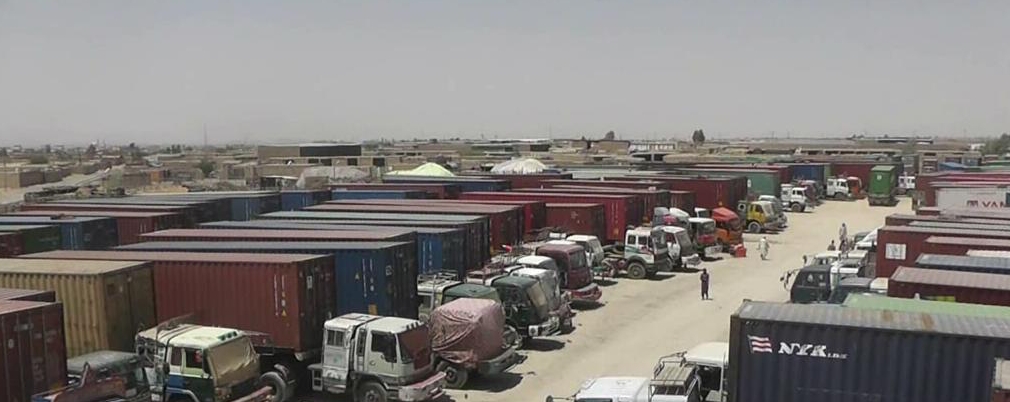
Trucks carrying containers are parked at Chaman border crossing on October 24, 2021 due to closure of the border suspending trade between Pakistan and Afghanistan through the border. (Photo courtesy Ehtisham Mufti)
Originally closed by Pakistani authorities due to security threats, disputes over issues ranging from COVID-19 to the validity of Afghan travel documents have prevented the re-opening of the Chaman crossing, despite severe hardship to truckers and local farmers.
The border was briefly opened on Sunday night and people from both sides were allowed to cross over mainly on medical grounds. However, it was closed again and no movement of goods from either side has been allowed since, according to traders.
Pakistani officials said the issue was on the Afghan side and they expected it to be resolved within the next few days. A spokesperson for the Taliban could not be reached for comment.
“They [Taliban] have some visa issues, that is why they have closed the border,” Zubair Motiwala, the Chairman of Pakistan Afghanistan joint Chambers of Commerce and Industry (PAJCCI), told Arab News. “They are saying they will open it in a couple of days.”
In the meantime, however, at least 50,000 people in Chaman district who are linked to cross-border trade in a population of around 200,000 continue to suffer.
“The border closure has driven some 50,000 small and medium traders out of business,” Jalaat Khan Achakzai, a local trader and former president of CCCI, told Arab News.
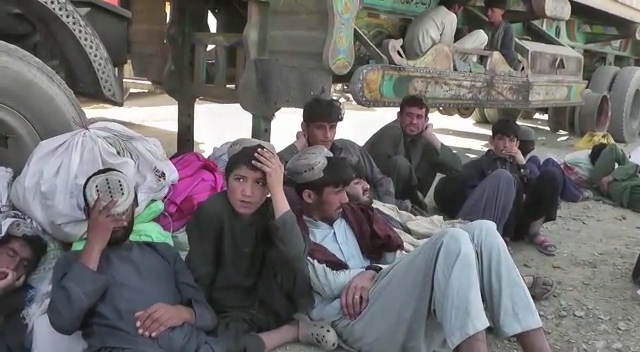
Transporters and laborers wait for the opening of Chaman border on October 24,2021, (photo courtesy Ehtisham Mufti)
Traders said trucks carrying dry fruits, vegetables and other perishable items were parked on both sides of the border.
“Around 2,000 trucks carrying loaded and empty containers are waiting,” Achakzai said. “Traders are also incurring losses as they have to pay around $150 container detention charges to the shipping companies.”
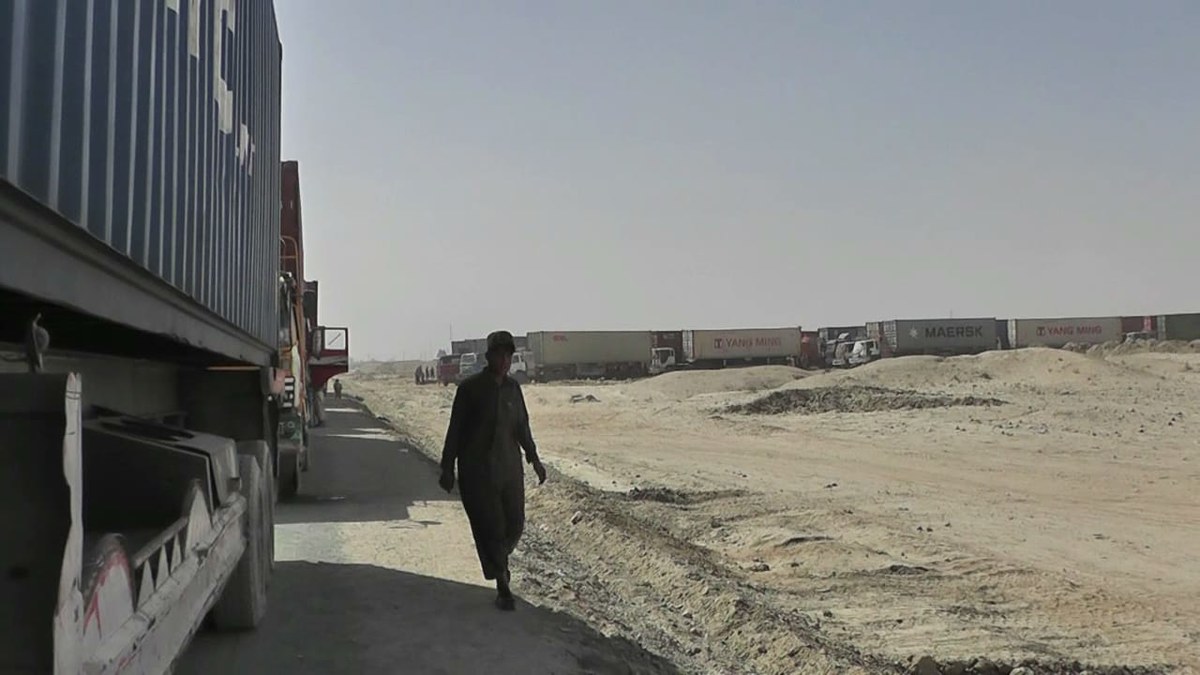
Trucks carrying containers are parked at Chaman border crossing on October 24, 2021 due to closure of the border suspending trade between Pakistan and Afghanistan through the border. (Photo courtesy Ehtisham Mufti)
“Talks between local officials and people from Spin Boldak happened but without any outcome. It is vital to open the border which is impacting the livelihood of more than half a million people on both the sides of border,” said Jamaluddin Achakzai, a local trader and former president of CCCI. “The transporters are selling the fuel, petrol and diesel of their vehicles to survive.”
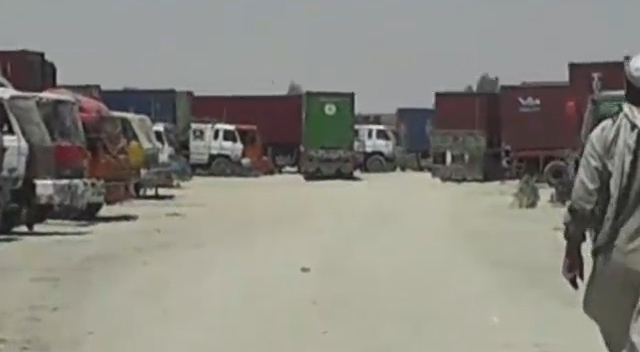
Trucks carrying containers are parked at Chaman border crossing on October 24, 2021 due to closure of the border suspending trade between Pakistan and Afghanistan through the border. (Photo courtesy Ehtisham Mufti)
Insiders who have traveled across the border said the condition of both Pakistani and Afghan transporters was worsening.
“Condition ofPakistani and Afghan truckers on the Afghan side is even more painful as they don’t have enough financial resources to survive,” Ehtisham Mufti, a senior Pakistani journalist who recently traveled through the area to Kandahar, told Arab News. “Human tragedy can be avoided if immediate measures are taken in time.”
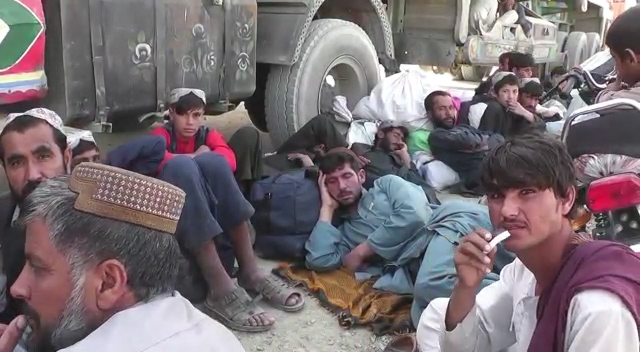
Transporters and laborers wait for the opening of Chaman border on October 24,2021, (photo courtesy Ehtisham Mufti)


